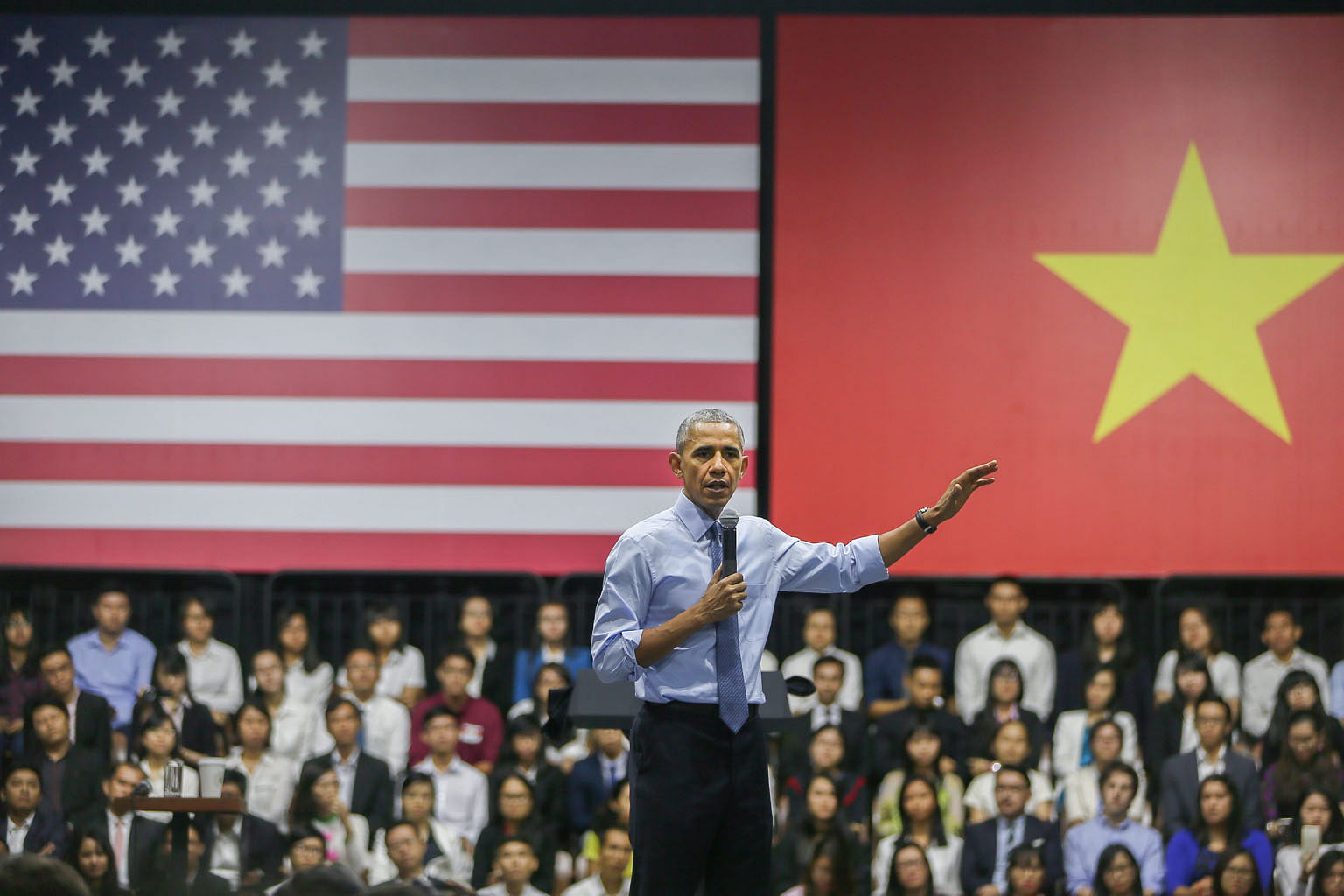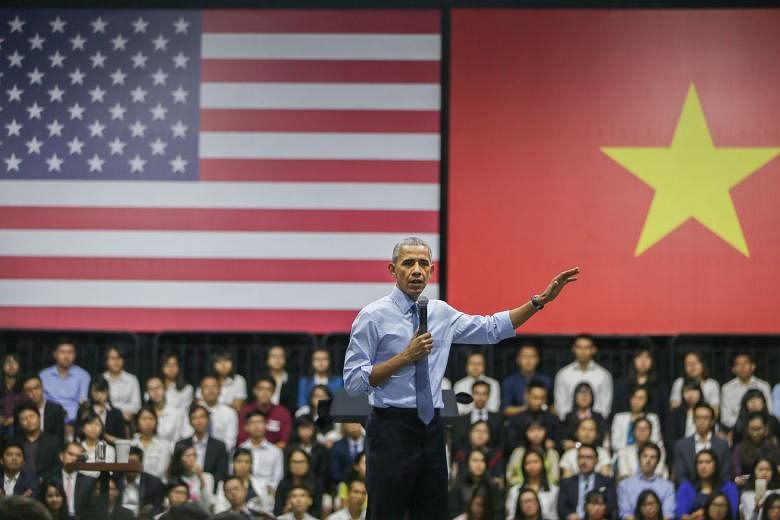Upgrading ties with ex-foe
Editorial
The Statesman, India
Mr Barack Obama has scripted a chapter in world history by lifting the embargo on the export of arms to Vietnam.
Much as the American President harps on the need to "develop ties and draw a line under the old enmity", Monday's watershed rapprochement also underscores the shared concerns of both Washington and Hanoi over China's increasing military clout.
The grandstanding in the Vietnamese capital scarcely overshadowed the game theory being vigorously pursued by Beijing, though it might have relegated to the footnotes the abiding visuals of a victim of the napalm bomb.
Mr Obama's signal of intent was almost a farewell message to the protagonists... 50 years after the worst confrontation since World War II.
He has, above all, underlined the dire imperative to "eliminate a lingering vestige of the Cold War".
The mending of fences with Cuba was one major step towards that noble end; if, as he asserts, both sides have developed a level of trust and cooperation, what matters most of all is that the armies of the two countries must deepen cooperation.

An equal responsibility devolves on the next occupant of the White House to carry the process forward.
Landmark initiatives between two countries that were once at war shape history as do conflicts and civil strife.
Suffice it to register that Mr Obama has announced an initiative that no other US President has had the nerve to try.
It is fairly obvious that Mr Obama is attempting to effect a diplomatic balance with Vietnam, and the initiative in the twilight phase of his presidency comes amid Chinese efforts to strengthen claims to disputed territory in the South China Sea, one of the world's most important waterways.
Two decades after President Bill Clinton restored relations with Vietnam, Mr Obama is anxious to upgrade equations with the emerging power.
Thanks to an expanding middle class, there is a promising market for US goods.
Above all, Vietnam could, in due course of time, be in a position to countenance China's growing strength.
Obama's visit to counter China
Editorial
The Yomiuri Shimbun, Japan
It will be a strong warning to China, which is accelerating its militarisation of artificial islands in the South China Sea and expanding its effective control over the region.
US President Barack Obama has made his first visit to Vietnam and held talks with Vietnamese officials, including President Tran Dai Quang. Mr Obama announced that the US is fully lifting the arms export embargo on Vietnam, saying, "Vietnam has access to the equipment it needs to defend itself".
Mr Obama probably made his latest decision on lifting the embargo in response to the increasingly tense situation in the South China Sea.
Washington's providing Hanoi with US-made reconnaissance planes and missiles in the days ahead will certainly enhance deterrence against China's expansionist maritime advances.
The US and Vietnamese leaders also agreed on boosting cooperation to improve the capabilities of the Vietnamese Navy, and on increasing US Navy vessels' calls at Vietnamese ports.
Vietnam is confronting China over issues such as territorial rights concerning the Spratly Islands in the South China Sea.
It is significant for Vietnam to have confirmed that it will work jointly with the US to deal with Chinese threats.
According to the US Department of Defence, China had reclaimed land in the Spratly Islands totalling about 13 sq km as of the end of last year, about a sixfold increase in reclaimed area in one year. By building radar and supply facilities, China is said to have reached the final phase of making the islands into permanent military outposts.
In the middle of this month, there was also an incident in which Chinese fighter jets carried out an intercept, flying unusually close to a US military reconnaissance aircraft that was on a routine patrol over the South China Sea. This was a dangerous, provocative action of China, which may bring about an unforeseen contingency.
It is essential that the US not only continues its patrol activities near the man-made islands to embody "freedom of navigation" on the basis of international law, but also to establish a system to intensify pressure against China with countries concerned, including Vietnam.
Viet trip to curb China's rise?
Editorial
China Daily, China
The visit by US President Barack Obama to Vietnam, the third by a US leader since diplomatic relations were restored in 1995, may serve as a footnote to the adage that there are no eternal allies or perpetual enemies, only eternal and perpetual interests.
More than four decades after the end of the Vietnam War, which killed millions of Vietnamese and 58,000 US troops, the former bitter foes have turned into friends and are seeking to boost their commercial, military and political relations.
But whatever common interests the two countries pursue, they should never compromise China's national interests and threaten regional security.
It is worrying to note the three-day visit has been described by some as a pivotal move in the US' strategic rebalancing to curb the rise of China.
The US, they say, is using Vietnam as an offset to China's growing strength in the region, especially after tensions increased in the South China Sea because of regional countries' competing sovereignty claims.
This, if true, bodes ill for regional peace and stability, as it would further complicate the situation in the South China Sea, and risk turning the region into a tinderbox of conflicts.
It remains to be seen whether such a worry is justified.
The growing mutual benefits shared between China and Vietnam markedly outweigh their differences.
China has long remained Vietnam's top trading partner, and leaders of the two countries have been working hard to maintain a relationship of "good neighbours, good friends, good comrades and good partners".
To distance himself from a confrontational stance against China, Mr Obama was quick to separate the decision to lift the Vietnam arms sales ban from any shared interest to contain China, saying it was based on completing the normalisation of relations with Vietnam, not on China. We hope Mr Obama means what he says.
- The View From Asia is a weekly compilation of articles from The Straits Times' media partner Asia News Network, a grouping of 22 newspapers. For more, see www.asianews.network

